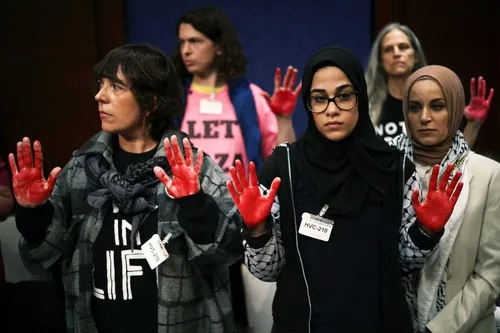
The UN Agency for Palestinian Refugees (UNRWA) warned of the risks of increasing hunger in the Gaza Strip after suffering cuts in its funding. Two weeks ago, the Israeli government accused agency officials of participating in the Hamas attack on Israeli territory that served as a pretext for the ongoing massacre in Palestine. After the complaint, the entity lost practically a third of its resources and the situation of Palestinians in the Gaza Strip became even more dramatic.
A six-page dossier prepared by Israel, which Reuters claims to have had access to, alleges that UNRWA employees had acted as Hamas or Islamic Jihad militants. The UN has not formally received a copy of the dossier, the organization’s spokesman, Stephane Dujarric, said on Monday (29). Palestinians accused Israel of falsifying information to tarnish the agency’s reputation.
A “thorough and urgent” investigation is underway, the UN said on its official website, and nine employees allegedly involved have been fired, according to Philippe Lazzarini, head of UNRWA. But none of these measures were enough to avoid losses to the agency. So far, 15 countries, including the United States and Germany — UNRWA’s biggest donors — have announced that they will suspend the contribution of resources, which will cause a hole of US$444 million in the agency’s finances, whose total budget is approximately US$ $1.2 billion.
“Many are hungry as the clock ticks down,” Lazzarini said. More than half of Gaza’s 2.3 million Palestinians seek daily assistance and UNRWA is already heavily strained by Israel’s war against Hamas. On Monday, the agency said it would be unable to continue its operations in Gaza and the wider region beyond the end of February if funding does not resume.
Unless new donors emerge, or these countries backtrack, by the end of February UNRWA will not be able to pay the salaries of its 30,000 employees, 13,000 of them in the devastated territory of the Gaza Strip. Possibly, the purchase and distribution of food and medicine will also be affected. Other humanitarian aid organizations would find it difficult to take on UNRWA’s role, given the complexities of gaining access to Gaza and the vast scale of needs.
On Tuesday (30), a US State Department spokesperson sought to downplay the seriousness of the decision, claiming that his country had already distributed 99% of the last approved amount. But the fact is that the situation of the Palestinians, already heavily affected by Israel’s military offensive, is likely to worsen if humanitarian aid, which is already insufficient, is reduced even further.
Hunger and despair
After almost four months of war, which has caused great destruction in Palestine, many people are on the brink of starvation. Some even loot humanitarian aid vehicles in search of food and supplies, as happened in Khan Yunis, in southern Gaza.
“We had a truck just this morning trying to get to Nasser Hospital, where there are patients and healthcare workers, all in need of food, but the population, very much in need, had already basically taken the supplies,” said Christian Lindmeier, spokesman of the World Health Organization (WHO), on Tuesday (30).
This type of incident, which is not rare, “shows how serious the needs are,” he told reporters, warning that diseases among Gaza’s malnourished population could “spread like wildfire and this goes beyond bombings and building collapses.” buildings.”
To make matters worse, the population of Gaza once again received evacuation orders from the Israeli army, according to OCHA, the UN humanitarian aid coordination office. “We are in the midst of another wave of displacement in Gaza, following eviction orders for large residential areas and in the midst of intense hostilities,” OCHA said in a post on X. “More people are being killed or injured. The south is overcrowded and humanitarian access to the north is extremely limited.”
For Bassam Khalil, who fled Jabaliya in northern Gaza to a UNRWA shelter in the south with his five children after the start of the war, the closure of the agency “would be a huge catastrophe”. “There are no other donors. Only UNRWA gives us flour, oil, canned food, sugar, milk, blankets and mattresses,” he said.
If UNRWA has to stop its operations, “we will all die of hunger,” said Om Ibrahim Alian, a mother of five children, including a newborn, all of whom survive on the agency’s food stamps, infant formula and diapers.
Sami Abu Shehadeh, a Palestinian politician in Israel, said cutting funding to UNRWA over allegations involving a dozen of its 30,000 employees amounts to “collective punishment.”
With information from the Financial Times and UN News
Editing: Lucas Estanislau
Source: www.brasildefato.com.br

